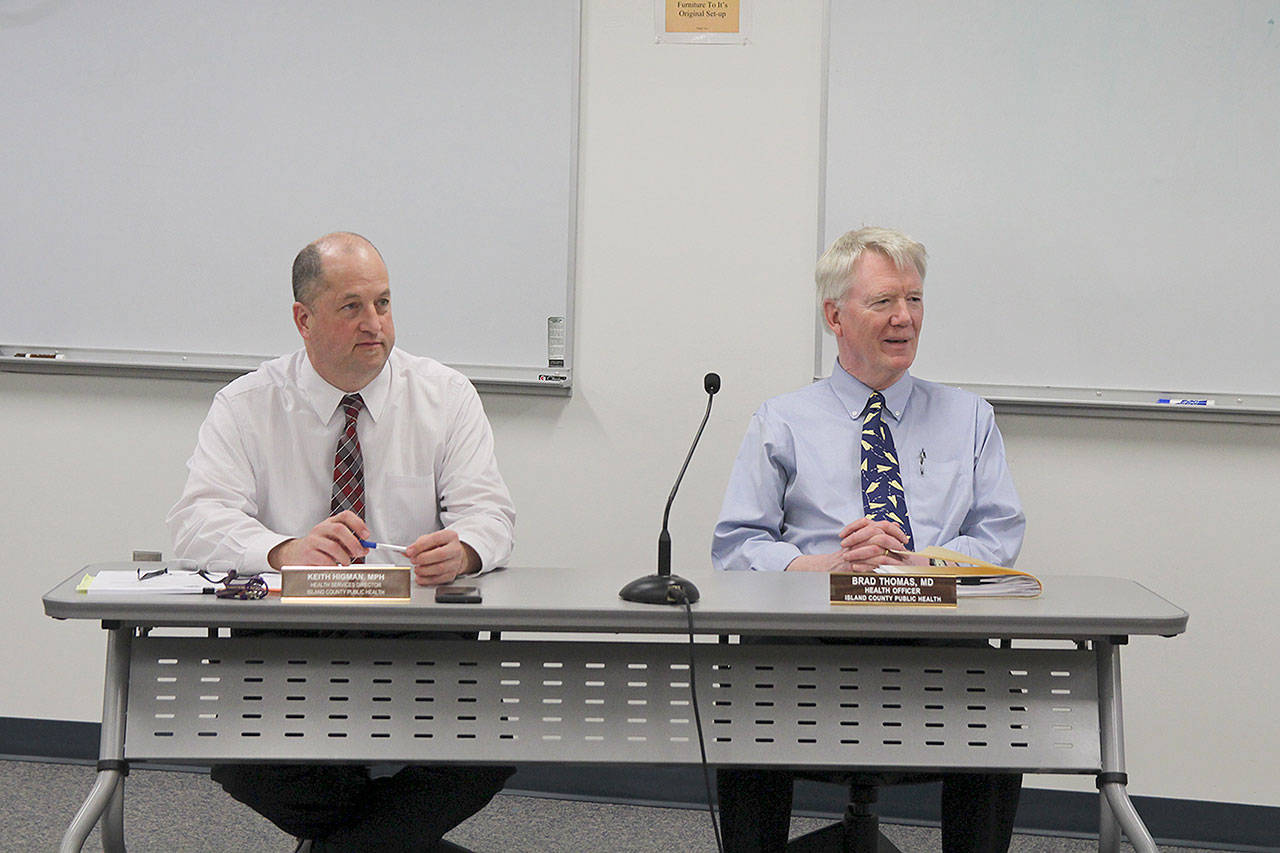The state Board of Health exonerated two Island County public health officials of charges that they were shirking their duties in not addressing military jet noise as a public health problem.
Separately, the state board also recommended that the Navy conduct a health impact assessment on Whidbey Island to determine if the noise from EA-18G Growlers is causing health problems.
Lauren Jenks, director of environmental public health sciences for the state Board of Health, presented the county board with the state Department of Health’s review of noise studies, which found that noise levels similar to those around Naval Air Station Whidbey Island could pose a threat to public health.
“It’s not something we would see as a public health emergency by a long shot,” she said, “but it may be a risk that needs to be taken seriously by the community and appropriately prioritized.”
The question of prioritizing public health concerns was at the center of the board’s discussion about the complaints against Island County’s top public health officials. In November, the board agreed to consider a complaint filed by the anti-jet-noise group Citizens of Ebey’s Reserve, or COER, against Public Health Director Keith Higman and Health Officer Dr. Brad Thomas for alleged neglect and refusal to obey or enforce specific statuary requirements in responding to noise from the Navy’s EA-18G Growler jets.
The Navy is planning on increasing the number of Growlers based on NAS Whidbey, which could mean a large increase in the number of aircraft-carrier-landing-practices at Outlying Field Coupeville.
At the meeting Wednesday, COER member Paula Spina said the group was turning to the state Board of Health for help because local leaders refuse to prioritize the issue.
“They are closing their eyes,” she said. “They say they have no clusters of disease because they don’t want to look for clusters of disease.”
The members of the state board, however, voted to take no action against the two men after a lengthy discussion.
David DeLong, the board’s health policy advisor, presented the staff’s preliminary investigation, recommending that the board dismiss three of the four allegations against the men. He also recommended that the board discuss the intent of RCW 70.05.070 and determine whether the health officer is required to inform the public about any specific risk. He pointed out that there were innumerable health concerns in the world.
The board members agreed that the health officer has to be able to prioritize the plethora of potential public health concerns in the community, which is what they determined Thomas and Higman have done. Both men agree that Growler noise does not represent a public-health emergency.
In an interview with the Whidbey News-Times, Thomas also pointed out that the world is full of health risks and that he can’t take action on all of them.
“We could post signs on beaches warning people about the risk of drowning,” he said as an example. “We could post signs on beaches warning people not to step on broken glass.”
Members of the state board also pointed out county officials are legally limited in what they can do to address military jet noise. The staff interviewed both Thomas and Higman during the preliminary investigation, as well as two members of COER.
Ken Pickard, a member of COER, told the state health board staff that the most “heinous” and likely easiest to prove allegation against the public health officials was their refusal to inform the public about the health risks of jet noise. COER asked the county to post warning signs and close parks at locations near the Outlying Field Coupeville.
According to the report to the state board, Thomas said he was told by staff in the county health department that members of COER were crazy, so he ignored them at first. He said things got “nasty” on the county board of health after COER starting going to meetings and demanding action in their confrontational style, according to the preliminary investigation.
Thomas claimed Island County Commissioner Jill Johnson, a member of the county board of health, privately told him not to bring up jet noise during a meeting. When he felt compelled to ask for guidance from the board, she said under her breath, “He’s fired. He just lost his job,” the document states.
The board of health then passed a resolution, in a 3-2 vote, to declare that jet noise is not a health emergency.
Thomas said Higman did not prevent him from taking any action on the issue, but warned that he proceeded “at his peril” if he does, the preliminary investigation states.
Thomas said he looked closely at information provided by COER and found that sleep disturbance and annoyance are unassailable issues connected with Navy jet noise; he also concluded that noise exposure is not a huge risk factor for the general population, but that individual outcomes may vary depending on the person. The state Health Department’s study mirrors this assessment.
Thomas also said he was frustrated with his lack of legal ability to address something that, based on community comments, is clearly a nuisance to many. In his interview with the staff, Higman said he didn’t believe hazardous noise conditions exist in the county related to Growler operations.
In a statement, Johnson wrote that COER’s action in filing the complaint against the two county officials was “shameful.” She pointed out that Higman devoted more than 20 years to the public health of the community and that Thomas is a respected retired physician.
“It’s time the broader community takes a hard look at who these people are,” she wrote, referring to COER, “and put the accountability for the division in our community squarely where it belongs.”



